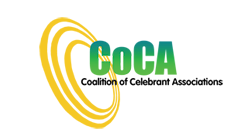CoCA’s position with respect to “the freedom of religion and other human rights”:
There are different types of “marriage celebrants’ in the Marriage Act1961. These are as follows:
Division 1 Authorised Marriage Celebrants.
This division is divided into 4 subdivisions
1. Subdivision A Ministers of Recognised Religions
2. Subdivision B State Officers (Civil)
3. Subdivision C Marriage Celebrants (Civil)
4. Subdivision D Religious Marriage Celebrants
Division 2 Marriages by foreign diplomatic or consular officers.
Division 3 Marriages of members of the Defence Force Overseas
Chaplains and Marriage Officers
There are anomalies in relation to the standards applied to the marriage ceremonies performed, terms of the level of regulation and how this regulation is monitored and legislated between the different types of celebrants providing marriage services valid under the Australian Act 1961.
CoCA’s position is that Australia’s Marriage Act does grant the enjoyment of the freedom of religion to those people in Australia who have religious beliefs. There are currently 23368 religious celebrants from over 650 different Recognised Religions 5 and religious organisations .6
Even prior to the December 2017 changes, religious ministers of Recognised Religions and religious organisations could require more of marrying couples than is required of couples using a civil marriage celebrant. Ministers are also able to refuse to marry a couple on the basis of religious belief.
Australia has balanced this respect for people of various religious faiths with respect for people with different ethical belief systems based upon human and civil rights.
This is due to the Marriage Act 1961 granting marrying couples access to civil marriage ceremonies through the state and territory offices of Births, Deaths and Marriages and some Court Magistrates. Since 1973, marrying couples have had access to independent civil celebrants who have the flexibility to marry couples outside “normal” office hours and in differing locations.
In the Australian context the term “civil” celebrant is used rather than “humanist” or “secular”, which implies agnostic or atheist beliefs held by the celebrant, and secondly as a consequence, civil celebrants’ personal beliefs should not affect the services they provide. This means civil celebrants are able to provide inclusive, meaningful and relevant ceremonial services to couples, families and communities7.


